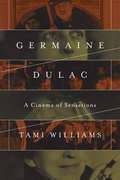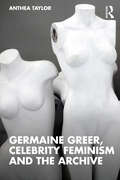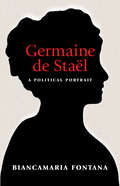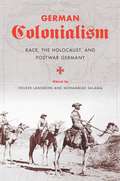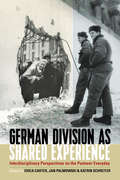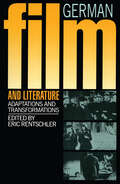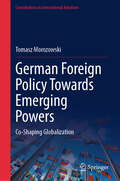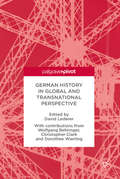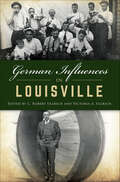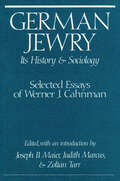- Table View
- List View
Geriatric Audiology
by Barbara WeinsteinCompletely revised and updated, Geriatric Audiology, Second Edition is a unique handbook that provides audiologists, speech language pathologists, and doctoral students in audiology with evidence-based, clinical guidance on evaluating and treating hearing loss in older adults. Focusing solely on geriatric audiology, this new edition contains the latest information on the demographics of aging as well as the biological, sociological, and psychological factors that affect geriatric hearing loss and its ramifications.
Geriatric Depression
by Gary J. KennedyWritten for a broad range of mental health professionals, this book explains why depression can be challenging to treat in older adults and describes the most effective interventions. Noted geriatric psychiatrist Gary J. Kennedy draws on extensive clinical experience and research to present current best practices in pharmacotherapy, psychotherapy, other psychosocial and lifestyle interventions, and electroconvulsive therapy. Depressive disorders complicated by psychosis, mania, dementia, and bereavement are addressed in detail, as is suicide prevention. Kennedy emphasizes the importance of integrating care across service settings and building strong partnerships with patients and their families. Quick-reference tables throughout the book distill critical elements of intervention. See also the author's award-winning Geriatric Mental Health Care: A Treatment Guide for Health Professionals, which provides a framework for treating the most frequently encountered psychiatric problems in this population.
Geriatric Mental Health Care
by Gary J. KennedyThis essential guide is designed for mental health practitioners and primary care providers without advanced training in geriatric psychiatry. Leading physician and educator Gary J. Kennedy sets forth a clear framework for understanding the interplay of medical, psychological, and social factors in frequently encountered problems among older adults. Clear guidelines are delineated for assessing and treating such conditions as depression and anxiety, dementia, psychosis and mania, sleep disturbances, personality and somatoform disorders, substance abuse, and suicidality. Throughout, Kennedy focuses on ways to sustain seniors' independence and overall quality of life while enhancing their adaptive capacities. Psychopharmacological principles are presented with an emphasis on safety, simplicity, and effectiveness, and the beneficial applications of individual, marital, family, and group psychotherapies are also addressed. Other topics covered include sexuality in old age, problems of elder abuse and neglect, collaborating with family members and other caregivers in medical and nonmedical settings, and legal and ethical issues in treatment.
Geriatric Psychiatry Review and Exam Preparation Guide: A Case-Based Approach
by Andrew Wiens Dallas Seitz Evan Lilly Mark RapoportGeriatric psychiatry is a relatively young discipline within the field of North American psychiatry. The development of a workforce to meet the needs of an aging population has been identified as an urgent priority, but there is still much we don’t know about fulfilling the mental health needs of older adults. For Mark J. Rapoport, geriatric psychiatrists must assess and treat patients today in face of the limitations of what we know, but also be armed with enthusiasm to create novel ways of impacting on the quality of life of older patients with mental illness. The chapters in this book include case scenarios, concise point-form summaries of diagnostic and treatment approaches, up-to-date evidence syntheses, discussions of controversies, and a series of practical and thought-provoking questions and answers. Geriatric Psychiatry is a succinct and advanced review of geriatric psychiatry that will help clinicians improve the psychiatric care of an aging population.
Germaine Dulac: A Cinema of Sensations
by Tami WilliamsBest known for directing the Impressionist classic The Smiling Madame Beudet and the first Surrealist film The Seashell and the Clergyman, Germaine Dulac, feminist and pioneer of 1920s French avant-garde cinema, made close to thirty fiction films as well as numerous documentaries and newsreels. Through her filmmaking, writing, and cine-club activism, Dulac's passionate defense of the cinema as a lyrical art and social practice had a major influence on twentieth century film history and theory. In Germaine Dulac: A Cinema of Sensations, Tami Williams makes unprecedented use of the filmmaker's personal papers, production files, and archival film prints to produce the first full-length historical study and critical biography of Dulac. Williams's analysis explores the artistic and sociopolitical currents that shaped Dulac's approach to cinema while interrogating the ground breaking techniques and strategies she used to critique conservative notions of gender and sexuality. Moving beyond the director's work of the 1920s, Williams examines Dulac's largely ignored 1930s documentaries and newsreels establishing clear links with the more experimental impressionist and abstract works of her early period. This vivid portrait will be of interest to general readers, as well as to scholars of cinema and visual culture, performance, French history, women's studies, queer cinema, in addition to studies of narrative avant-garde, experimental, and documentary film history and theory.
Germaine Greer, Celebrity Feminism and the Archive
by Anthea TaylorGermaine Greer, Celebrity Feminism and the Archive, the first scholarly book on this internationally renowned feminist, draws upon Greer’s largely unexplored archive to demonstrate her impact on readers and viewers since the 1970s.Across many decades in the limelight and through multiple media forms, the provocative Greer has worked to shape audience understandings of gender, sexuality, and feminism. Through deep engagement with archival material, Anthea Taylor offers a compelling reassessment of Greer’s celebrity feminist labour and its effects over time. Examining archived letters from fans, anti-fans, and those in between, this innovative volume shows how and why readers and viewers have come to affectively invest – or disinvest – in this iconoclastic feminist. Advancing debates about the social and political function of celebrity, Germaine Greer, Celebrity Feminism and the Archive is essential reading for scholars in Gender Studies, History, Archival Studies, and Media and Cultural Studies.
Germaine de Stael: A Political Portrait
by Biancamaria FontanaGermaine de Staël (1766-1817) is perhaps best known today as a novelist, literary critic, and outspoken and independent thinker. Yet she was also a prominent figure in politics during the French Revolution. Biancamaria Fontana sheds new light on this often overlooked aspect of Staël's life and work, bringing vividly to life her unique experience as a political actor in a world where women had no place.The banker's daughter who became one of Europe's best-connected intellectuals, Staël was an exceptionally talented woman who achieved a degree of public influence to which not even her wealth and privilege would normally have entitled her. During the Revolution, when the lives of so many around her were destroyed, she succeeded in carving out a unique path for herself and making her views heard, first by the powerful men around her, later by the European public at large. Fontana provides the first in-depth look at her substantial output of writings on the theory and practice of the exercise of power, setting in sharp relief the dimension of Staël's life that she cared most about--politics. She was fascinated by the nature of public opinion, and believed that viable political regimes were founded on public trust and popular consensus. Fontana shows how Staël's ideas were shaped by the remarkable times in which she lived, and argues that it is only through a consideration of her political insights that we can fully understand Staël's legacy and its enduring relevance for us today.
German Bodies: Race and Representation After Hitler
by Uli LinkeFirst published in 1999. Routledge is an imprint of Taylor & Francis, an informa company.
German Chicago: Revisited (Images of America)
by Raymond LohneGerman Chicago Revisited follows the photographic study which began in German Chicago: The Danube Swabians and the American Aid Societies. With this latest title in the Images of America series, historian and photographer Raymond Lohne crafts another volume about a group of American citizens who preserve their rich heritage with unwavering effort.This book will give readers a glimpse into the life of a close-knit and highly active community, revealing groups like the Kerneir Pleasure Club, the American Aid Society, and the Society of the Danube Swabians. The German musical life of the city is featured, as is the Karneval season and other year-round festivities and celebrations of the Deutsch-Americans of Chicago and its suburbs.
German Chicago: The Danube Swabians and the American Aid Societies
by Raymond LohneIn German Chicago: The Danube Swabians and the American Aid Societies, historian Raymond Lohne presents the Germans who came to be called the Donauschwaben and their American counterparts. This amazing photographic collection of over 200 historic images has been gathered through the efforts of the author and survivors of the Expulsion, as well as numerous German-American societies and individuals throughout the nation.
German Cinema - Terror and Trauma: Cultural Memory Since 1945
by Thomas ElsaesserIn German Cinema – Terror and Trauma Since 1945, Thomas Elsaesser reevaluates the meaning of the Holocaust for postwar German films and culture, while offering a reconsideration of trauma theory today. Elsaesser argues that Germany's attempts at "mastering the past" can be seen as both a failure and an achievement, making it appropriate to speak of an ongoing 'guilt management' that includes not only Germany, but Europe as a whole. In a series of case studies, which consider the work of Konrad Wolf, Alexander Kluge, Rainer Werner Fassbinder, Herbert Achterbusch and Harun Farocki, as well as films made in the new century, Elsaesser tracks the different ways the Holocaust is present in German cinema from the 1950s onwards, even when it is absent, or referenced in oblique and hyperbolic ways. Its most emphatically "absent presence" might turn out to be the compulsive afterlife of the Red Army Faction, whose acts of terror in the 1970s were a response to—as well as a reminder of—Nazism’s hold on the national imaginary. Since the end of the Cold War and 9/11, the terms of the debate around terror and trauma have shifted also in Germany, where generational memory now distributes the roles of historical agency and accountability differently. Against the background of universalized victimhood, a cinema of commemoration has, if anything, confirmed the violence that the past continues to exert on the present, in the form of missed encounters, retroactive incidents, unintended slippages and uncanny parallels, which Elsaesser—reviving the full meaning of Freud’s Fehlleistung—calls the parapractic performativity of cultural memory.
German Colonialism: Race, the Holocaust, and Postwar Germany (Routledge Studies In Modern European History Ser.)
by Mohammad Salama Eds. Langbehn VolkerMore than half a century before the mass executions of the Holocaust, Germany devastated the peoples of southwestern Africa. While colonialism might seem marginal to German history, new scholarship compares these acts to Nazi practices on the Eastern and Western fronts. With some of the most important essays from the past five years exploring the "continuity thesis," this anthology debates the links between German colonialist activities and the behavior of Germany during World War II. Some contributors argue the country's domination of southwestern Africa gave rise to perceptions of racial difference and superiority at home, building upon a nascent nationalism that blossomed into National Socialism and the Holocaust. Others remain skeptical and challenge the continuity thesis. The contributors also examine Germany's colonial past with debates over the country's identity and history and compare its colonial crimes with other European ventures. Other issues explored include the denial or marginalization of German genocide and the place of colonialism and the Holocaust within German and Israeli postwar relations.
German Division as Shared Experience: Interdisciplinary Perspectives on the Postwar Everyday
by Jan Palmowski Erica Carter Katrin SchreiterDespite the nearly three decades since German reunification, there remains little understanding of the ways in which experiences overlapped across East-West divides. German Division as Shared Experience considers everyday life across the two Germanies, using perspectives from history, literary and cultural studies, anthropology and art history to explore how interconnections as well as fractures between East and West Germany after 1945 were experienced, lived and felt. Through its novel approach to historical method, the volume points to new understandings of the place of narrative, form and lived sensibility in shaping Germans’ simultaneously shared and separate experiences of belonging during forty years of division from 1945 to 1990.
German Division as Shared Experience: Interdisciplinary Perspectives on the Postwar Everyday
by Katrin Schreiter Erica Carter, Jan PalmowskiDespite the nearly three decades since German reunification, there remains little understanding of the ways in which experiences overlapped across East-West divides. German Division as Shared Experience considers everyday life across the two Germanies, using perspectives from history, literary and cultural studies, anthropology and art history to explore how interconnections as well as fractures between East and West Germany after 1945 were experienced, lived and felt. Through its novel approach to historical method, the volume points to new understandings of the place of narrative, form and lived sensibility in shaping Germans’ simultaneously shared and separate experiences of belonging during forty years of division from 1945 to 1990.
German Exile Politics: The Social Democratic Executive Committee in the Nazi Era
by Lewis J. EdingerThis title is part of UC Press's Voices Revived program, which commemorates University of California Press’s mission to seek out and cultivate the brightest minds and give them voice, reach, and impact. Drawing on a backlist dating to 1893, Voices Revived makes high-quality, peer-reviewed scholarship accessible once again using print-on-demand technology. This title was originally published in 1956.
German Film & Literature
by Eric RentschlerFirst Published in 1986. Routledge is an imprint of Taylor & Francis, an informa company.
German Film after Germany: Toward a Transnational Aesthetic
by Randall HalleWhat is the work of film in the age of transnational production? To answer that question, Randall Halle focuses on the film industry of Germany, one of Europe's largest film markets and one of the world's largest film-producing nations. In the 1990s Germany experienced an extreme transition from a state-subsidized mode of film production that was free of anxious concerns about profit and audience entertainment to a mode dominated by private interest and big capital. At the same time, the European Union began actively drawing together the national markets of Germany and other European nations, sublating their individual significances into a synergistic whole. This book studies these changes broadly, but also focuses on the transformations in their particular national context. It balances film politics and film aesthetics, tracing transformations in financing along with analyses of particular films to describe the effects on the film object itself. Halle concludes that we witness currently the emergence of a new transnational aesthetic, a fundamental shift in cultural production with ramifications for communal identifications, state cohesion, and national economies.
German Foreign Policy Towards Emerging Powers: Co-Shaping Globalization (Contributions to International Relations)
by Tomasz MorozowskiThis book examines the complex process of German foreign policy adaptation to a shifting global landscape, especially to the rise of new powers. Addressing a scholarly audience, the book sheds light on the evolution of Germany's post-reunification international role beyond the Euro-Atlantic structure. Grounded within the theoretical framework of neoclassical realism, the book analyzes the inner workings of Germany's global policy formation. It scrutinizes the state's relations with rising and emerging powers, including China, Brazil, India, South Africa, Mexico, Vietnam, Indonesia, Nigeria, Saudi Arabia, and the United Arab Emirates, exploring the details of Berlin's approach. The book presents the motives, goals, instruments, and future prospects of Germany's foreign policy regarding these states. It further explores the dynamics of Germany's civilian and economic power, while addressing the growing call for increased responsibility within the European Union as well as in global politics. Readers will gain insight into the foundations, tools, and effectiveness of Germany's foreign policy, providing a quintessential case study of how a European state navigates the challenges of a rapidly changing global landscape. This makes the book a must-read for researchers specializing in German studies as well as for scholars of international relations and foreign policy.
German History in Global and Transnational Perspective
by David LedererThis is a collection of essays from three of the world’s pre-eminent historians of Germany, which consider German history in global and transnational contexts. It is well known that transnationalism has exploded in the last decade or so as a new academic subfield of international and global history. What the transnationalism literature often ignores or downplays, however, is the role of the nation-state in making the transnational possible in the first place, as noted in its very etymological origins. This volume traces this dynamic from a different vantage-point, namely the relationship between German history and transnationalism. Each essay applies a transnational framework in fresh and original ways in order to illuminate different facets of the connections between Germany and the wider world in the modern period. Together they will encourage the rethinking of assumptions about key moments and developments in the history of modern Germany, and foster reflection on the evolving nature of German history as a subject studied in the twenty-first century.
German Idealism and the Concept of Punishment
by Joseph J. Kominkiewicz Frances BrownAgainst the background of early modernism - a period that justified punishment by general deterrence - Kant is usually thought to represent a radical turn towards retributivism. For Kant, and later for Fichte and Hegel, a just punishment respects the humanity inherent in the criminal, and serves no external ends - it is instituted only because the criminal deserves it. In this original study, Jean-Christophe Merle uses close analysis of texts to show that these philosophers did not in fact hold a retributivist position, or even a mixed position; instead he traces in their work the gradual emergence of views in favour of deterrence and resocialisation. He also examines Nietzsche's view that morality rests on the rejection of retribution. His final chapter offers a challenge to the retributivist position, and a defence of resocialisation, in the context of current legal theory and practice concerning the punishment of crimes against humanity.
German Idealism and the Jew: The Inner Anti-Semitism of Philosophy and German Jewish Responses
by Michael MackIn German Idealism and the Jew, Michael Mack uncovers the deep roots of anti-Semitism in the German philosophical tradition. While many have read German anti-Semitism as a reaction against Enlightenment philosophy, Mack instead contends that the redefinition of the Jews as irrational, oriental Others forms the very cornerstone of German idealism, including Kant's conception of universal reason. Offering the first analytical account of the connection between anti-Semitism and philosophy, Mack begins his exploration by showing how the fundamental thinkers in the German idealist tradition—Kant, Hegel, and, through them, Feuerbach and Wagner—argued that the human world should perform and enact the promises held out by a conception of an otherworldly heaven. But their respective philosophies all ran aground on the belief that the worldly proved incapable of transforming itself into this otherworldly ideal. To reconcile this incommensurability, Mack argues, philosophers created a construction of Jews as symbolic of the "worldliness" that hindered the development of a body politic and that served as a foil to Kantian autonomy and rationality. In the second part, Mack examines how Moses Mendelssohn, Heinrich Heine, Franz Rosenzweig, and Freud, among others, grappled with being both German and Jewish. Each thinker accepted the philosophies of Kant and Hegel, in varying degrees, while simultaneously critiquing anti-Semitism in order to develop the modern Jewish notion of what it meant to be enlightened—a concept that differed substantially from that of Kant, Hegel, Feuerbach, and Wagner. By speaking the unspoken in German philosophy, this book profoundly reshapes our understanding of it.
German Immigrants, Race, and Citizenship in the Civil War Era
by Alison Clark EffordThis study of Civil War-era politics explores how German immigrants influenced the rise and fall of white commitment to African-American rights. Intertwining developments in Europe and North America, Alison Clark Efford describes how the presence of naturalized citizens affected the status of former slaves and identifies 1870 as a crucial turning point. That year, the Franco-Prussian War prompted German immigrants to reevaluate the liberal nationalism underpinning African-American suffrage. Throughout the period, the newcomers' approach to race, ethnicity, gender, and political economy shaped American citizenship law.
German Influences in Louisville (American Heritage)
by C. Robert UllrichThe first German immigrants in Louisville were shoemakers, bakers, butchers, blacksmiths and brewers--literally everything from basket makers to carriage manufacturers. Later, these industrious immigrants became captains of industry and influence in the city. August Prante's family built many of the magnificent organs for Louisville churches. Abraham Flexner was a pioneer in medical education, while Louis Brandeis was the first Jew to serve on the United States Supreme Court. William George Stuber, the son of Louisville photographer Michael Stuber, became the president of the Eastman Kodak Company. C. Robert Ullrich and Victoria A. Ullrich present a series of essays detailing how German immigrants shaped the industry and culture of Louisville.
German Jewry and the Allure of the Sephardic
by John M. EfronIn the eighteenth and nineteenth centuries, as German Jews struggled for legal emancipation and social acceptance, they also embarked on a program of cultural renewal, two key dimensions of which were distancing themselves from their fellow Ashkenazim in Poland and giving a special place to the Sephardim of medieval Spain. Where they saw Ashkenazic Jewry as insular and backward, a result of Christian persecution, they depicted the Sephardim as worldly, morally and intellectually superior, and beautiful, products of the tolerant Muslim environment in which they lived. In this elegantly written book, John Efron looks in depth at the special allure Sephardic aesthetics held for German Jewry.Efron examines how German Jews idealized the sound of Sephardic Hebrew and the Sephardim's physical and moral beauty, and shows how the allure of the Sephardic found expression in neo-Moorish synagogue architecture, historical novels, and romanticized depictions of Sephardic history. He argues that the shapers of German-Jewish culture imagined medieval Iberian Jewry as an exemplary Jewish community, bound by tradition yet fully at home in the dominant culture of Muslim Spain. Efron argues that the myth of Sephardic superiority was actually an expression of withering self-critique by German Jews who, by seeking to transform Ashkenazic culture and win the acceptance of German society, hoped to enter their own golden age.Stimulating and provocative, this book demonstrates how the goal of this aesthetic self-refashioning was not assimilation but rather the creation of a new form of German-Jewish identity inspired by Sephardic beauty.
German Jewry: Its History and Sociology
by Joseph B. MaierThis history of post-Emancipation German Jewry and of the Holocaust aftermath has received considerable scholarly attention. The study of Jewish life in Germany in the 1930s and the migration impelled by the Nazi period has, on the other hand, been comparatively neglected. The work of Werner J. Cahnman (1902-1980) goes a long way toward filling this gap.Cahnman's examination of "the Jewish people that dwells among the nations" is focused on Germany because it was the country "where in modern times the symbiosis . . . has been most intimate and it also has been the country where the conflict degenerated into the monstrosity of the Holocaust." This representative anthology of his essays shares a common theme, although the examples differ in thought, method and style. Whether he explores the stratification of pre-Emancipation German Jewry, the rise of the Jewish national movement in Austria, or such an esoteric topic as the influence of the kabbalistic tradition on German idealist philosophy; whether he muses on the writing of Jewish history or reports on his firsthand experience in Dachau, Cahnman's work reflects central concerns of his personal and scholarly existence as a German Jew. Because he usually combined extensive empirical data with his own background and personal experience, he is able to craft a penetrating analysis of the recent history of Jewish life in Central Europe. Werner Cahnman believed that the "writing of history is vital for the continued cultural identity of the human kind."




